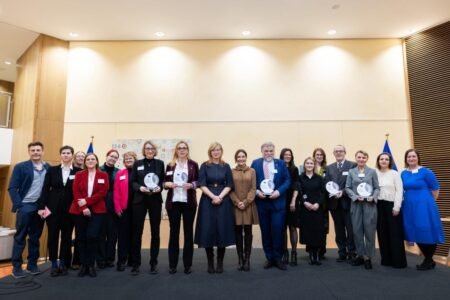The Horizon 2020 Work Programme for the years 2014-15 sets out the funding opportunities under the different parts of the programme; all are being published today on the Participant Portal. Each part describes the overall objectives, the respective calls, and the topics within each call. Each topic describes the challenge to be addressed, the scope of the activities to be carried out, and the expected impacts to be achieved. Compared with the Seventh Framework Programme (FP7), there are relatively fewer calls and topics. The Work Programme reflects the strong challenge-based approach of Horizon 2020, allowing applicants to have considerable freedom to come up with innovative solutions. This MEMO highlights some key aspects of the Work Programme.
Advertisement
Twelve focus areas
A number of areas have been identified for special focus in the first Horizon 2020 Work Programme. Each of these is embedded in the relevant parts of the Work Programme, and covered by a specific call. The 12 focus areas represent around 15% of the total number of calls covered by the Work Programme and amount for a total 2014 budget of 2 billion.
Personalising health and care (2014 budget: 549 million)
The cost of healthcare in Europe will soon reach 10 per cent of GDP, and this figure is likely to go up as Europe’s population is getting older and as chronic diseases are on the rise. This is where the ‘personalising health and care’ focus area comes in. By better understanding the causes of health and disease and making best use of big data, we can develop better diagnostics (e.g. in vivo medical imaging), therapies (e.g. clinical trials for non-communicable diseases), health promotion and disease prevention strategies (e.g. environment and health based interventions) at the personal and population levels, as well as technologies to support healthy ageing (e.g. mHealth applications). Funding in this area also aims to deliver breakthrough research and innovation in poverty related and antibiotic resistant infectious diseases (e.g. vaccine platforms for HIV/AIDS and tuberculosis).
Sustainable food security (2014 budget: 138 million)
Ensuring that all people have access to sufficient, affordable, safe and nutritious food is a key challenge for our society. It has also a crucial economic importance: in 2011, agricultural exports accounted for around 7% of the total value of EU exports and the whole agri-food sector employs 17 million people in Europe. This focus area aims at developing competitive and resource-efficient aquatic and terrestrial food production systems and technologies for a sustainable food chain, as well as promoting safe foods and healthy diets for all and understanding the global drivers for food security. It is expected that efforts in research will help achieve a 20% gain in resource use efficiency; help reverse a diminishing trend of productivity gains in primary production; enable food safety policy to be continually adjusted in the light of new scientific evidence; and provide the integrated EU approach needed for reducing ill health due to poor nutrition, overweight and obesity. For example, funding in this area will aim at fighting native and alien pests affecting plants, eliminating discards in European fisheries, discovering innovative and sustainable protein sources of the future and promoting sustainable food chains through public policies.
Blue growth: unlocking the potential of seas and oceans (2014 budget: 100 million)
The Blue Growth economy in the EU is expected to grow to 7 million people employed by 2020. Actions in this area will be in line with the EU Blue Growth Strategy and relevant EU policies, as well as provide international cooperation opportunities in particular for Atlantic Ocean research. The calls in this area invite, for example, proposals on Atlantic observation systems, an integrated response capacity to oil spills and marine pollution, climate change impacts on fisheries and aquaculture and ocean literacy.
Digital security (2014 budget: 47 million)
Digital Security has many facets, including cybercrime, online privacy and the protection of fundamental rights. Digital Security in Horizon 2020 focuses on basic research and also the economic and societal dimension of security and privacy in the digital ecosystem, to ensure a well-functioning EU single market. It also helps implement the EU’s wider cybersecurity strategy and the Digital Agenda. In particular, Horizon 2020 will fund research into activities which aim to increase the security of current applications, services and infrastructures and support the creation of lead markets and market incentives in Europe.
Smart cities and communities (2014 budget: 92 million)
Two thirds of the EU population lives in urban areas, using 70% of the energy. Research carried out under “Smart cities and communities” will aim at finding solutions with high market potential in fields such as energy efficiency in neighbourhoods, providing digital services and information for citizens or smart mobility services. So-called lighthouse projects will create strong partnerships between industries, academics and cities while empowering citizens to take an active part in improving quality of life in cites. The projects will demonstrate and validate attractive business plans that will attract funding and allow large scale replication. For example, EU funding could help develop nearly-zero energy districts, through better management of local resources, sustainable refurbishment of residential buildings and the application of cross-cutting ICT solutions.
Competitive low-carbon energy (2014 budget: 359 million)
The EU aims to reduce greenhouse gas emissions by 20% below 1990 levels by 2020, with a further reduction to 80-95% by 2050. The aim of the “Competitive low-carbon energy” call is to support this transition by tackling the whole innovation process, covering a wide range of technology readiness levels, combining R&D with market uptake and by addressing non-technological issues (standardisation, social sciences and humanities, impact analysis, etc.). One of the challenges addressed under this focus area is the integration of next-generation renewable energy technologies into the future energy system. The public-private partnerships on “Fuel Cells and Hydrogen” and on the “Bioeconomy” will contribute to the objectives of this focus area.
Energy Efficiency (2014 budget: 98 million)
About 40% of EU final energy consumption is in buildings and around 25% in industry. Activities under the “Energy Efficiency” focus area will deliver energy savings in these two sectors. The first calls invite proposals to carry out research and demonstration of more energy-efficient solutions e.g. building components or highly energy-efficient heating and cooling systems – as well as proposals to facilitate policy implementation and skills development, and mobilise financing for the market uptake of more energy efficient products, systems and services.
Mobility for growth (2014 budget: 375 million)
Transport accounts for about 63% of oil consumption and 29% of all CO2 emissions. Research and innovation on equipment and systems for vehicles, aircraft and vessels will make them smarter, more automated, cleaner and quieter – while reducing the use of fossil fuels and improving air quality. One of the main objectives of Horizon 2020 in the field of transport is the deployment of innovative traffic management and information systems, advanced traveller services, efficient logistics and construction and maintenance technologies. For example, the first calls will fund projects aiming at developing new technologies for very-low emission vehicles and vessels, at reducing urban road congestion as well as improving intelligent mobility.
Waste: a resource to recycle, reuse and recover raw materials (2014 budget: 73 million)
Full compliance with EU waste policy could create an additional 400,000 jobs within the EU and an extra annual turnover of 42 billion. Research activities will address the whole production and consumption cycle: from waste prevention, the design of products and processes for recyclability to re-use and waste disposal. The calls provide stakeholders from different sectors with the opportunity to work together in new ways. Citizens will also be involved in developing and testing innovative solutions for waste prevention and management.
Water innovation: boosting its value for Europe (2014 budget: 67 million)
Water is fundamental to human health, food security, sustainable development and the environment. It is also an economic sector of growing importance for Europe with a turnover of some 80 billion a year, making it an invaluable source for growth and jobs. Specific actions under this focus area will contribute to the Strategic Innovation Plan of the European Innovation Partnership on Water. For example, activities will include bringing innovative water solutions to the market, harnessing water research and innovation results for the benefit of industry, policy makers and citizens in Europe and worldwide as well as integrated approaches to water management and climate change.
Overcoming the crisis: new ideas, strategies and governance structures for Europe (2014 budget: 35 million)
Actions encompass socio-economic research on ways to make economic and monetary union resilient and sustainable, the European growth agenda, the social, political and cultural consequences of and responses to the crisis and other political challenges for Europe. The focus area also foresees research into the future of urban areas and how emerging ICT technologies can be employed in the public sector.
Disaster-resilience: safeguarding and securing society, including adapting to climate change (2014 budget: 72 million)
The cost of natural and man-made disasters, crime and terrorism in terms of environmental and socio-economic impacts amounts on average to annual losses of 5% of EU GDP. The objective within this challenge is to reduce the loss of human life, environmental, economic and material damage from such threats. For example, funding will be provided for projects that use science and innovation for adaptation to climate change by moving from assessing costs, risks and opportunities to demonstration of options and practices.
Industrial leadership
European industry is facing many challenges, such as global competition, and the need for energy and resource efficiency. Investing in research and innovation is essential to address these challenges and, at the same time, help develop and deploy solutions to meet other societal needs in health, energy, climate and so on.
Key Enabling Technologies (KETs) are at the heart of a broad range of new and future smart applications and products. Horizon 2020 will support enabling technologies, such as nanotechnologies, advanced materials and advanced manufacturing and processing technologies. Investing in these areas will develop European industrial capabilities and secure Europe’s position in global markets, helping boost competitiveness, create jobs and support growth.
The calls under this part of Horizon 2020 will invite proposals that are outcome-oriented and can bring technologies closer to the market. For example, the NMP 8 -2014 call on “Scale-up of nanopharmaceuticals production” invites proposals that will develop one or more pilot lines and processes for the scaling-up of the production of innovative nanopharmaceuticals to the quantities needed for clinical testing, taking into account medical-regulatory requirements.
Cross cutting issues
Horizon 2020 cross-cutting issues have been mainstreamed in each of the different parts of the Work Programme, ensuring a more integrated approach.
Innovation
Substantial support will be provided for innovation through activities such as prototyping, testing, demonstrating, piloting, large-scale product validation and market replication. Significant support to demand side approaches will be another important feature, notably pre-commercial and first-commercial public procurement of innovation, as well as regulation to foster innovation and standard-setting. There will also be the piloting of new forms and sources of innovation including public sector and social innovation as well as pilots on private sector services and products.
Spreading excellence and widening participation
The existence of internal disparities in research and innovation performance within the EU hinders some Member States from meeting their full potential. Low performance is also reflected in the participation patterns of some Member States in framework programmes, with limiting factors such as a low level of national investment in research and innovation and reduced access to research networks. The first calls will include offers of funding of a total of 50 million targeting those Member States through measures such as Teaming, Twinning and ERA Chairs.
Information and Communications Technology
The Information and Communications Technology (ICT) sector represents 4.8% of the EU economy and accounts for 25% of total business expenditure in Research and Development (R&D). The transformative power of ICT can also help address many of Europe’s most pressing societal challenges in areas such as health, the environment and fostering secure and inclusive societies. In Horizon 2020, the EU is investing at least 25% more in ICT research than in previous research programmes. This will support the full range, from high-risk, ground-breaking research to innovation that can deliver revolutionary business breakthroughs, often on the basis of emerging technologies. Around 1.2 billion of funding for ICT is available through the first Horizon 2020 calls.
The ICT part of the first Horizon 2020 work programme focuses on the development of a new generation of components and systems, including micro- and nano-electronics and photonics technologies, next generation computing, infrastructures, technologies and services for the future Internet, content technologies, and advanced interfaces and robotics.
Social Sciences and Humanities
Social Sciences and Humanities research (SSH) is fully integrated into each of the pillars of Horizon 2020 and each of the specific objectives. It is a key objective that SSH will contribute to the evidence base for policy making at international, EU, national, and regional levels. In addition, SSH is at the heart of the societal challenge ‘Europe in a changing world: Inclusive, innovative and reflective societies’ (part 13 of the Work Programme).
Almost 200 topics in the programmed parts of Horizon 2020 are relevant to Social Sciences and Humanities. This represents around 35% of the total topics in the Work Programme. All these are flagged by the system designed for searching the Work Programme. Estimated budget to SSH related topics: over 400 million (in addition to funding available through the ERC and the MSCA)
Gender
Applicants to Horizon 2020 are encouraged to promote equal opportunities in the implementation of the action and to ensure a balanced participation of women and men at all levels in research and innovation teams and in management structures. The gender dimension is explicitly integrated into several topics across all the sections of the Work Programme (for example, novel visualisation tools for enhanced nanotechnology awareness, the human factor in the energy system, moving towards a circular economy through industrial symbiosis
). An in-depth understanding of both sexes’ needs, behaviours and attitudes contributes to the scientific quality and societal relevance of produced knowledge, technologies and innovations. It also contributes to the production of goods and services better suited to potential markets. A topic is considered gender relevant when it and/or its findings affect individuals or groups of persons. These topics are flagged to ease access for applicants. For example, a specific call promoting gender equality in research and innovation is included in the ‘Science With and For Society’ Work Programme ( 9.5 million).
International Cooperation
International cooperation in research and innovation is a cross-cutting priority in Horizon 2020. The programme is open to the participation of researchers from across the world. In addition, targeted international cooperation activities are included across the societal challenges, enabling and industrial technologies and other relevant parts of the programme. For each of these activities, the area and partner for cooperation are identified upfront .
In addition, organisations who wish to establish an international collaboration network with research centres, universities or companies based in and/or outside Europe can apply to the Marie Sk?odowska-Curie Action “Research and Innovation Staff Exchange” (RISE). The objective is to create partnerships between academic institutions and/or companies based in Europe and beyond through the exchange of staff for a short period.
The EU also reaches out to non-European top talent through European Research Council (ERC) grants, which are open to the best researchers of any nationality willing to come to Europe. ERC grantees’ team members can also be of any nationality.
Climate Action and Sustainable Development
There is untapped potential for the European economy to be more innovative, productive and competitive whilst using fewer resources and reducing environmental impacts. It is expected that at least 60% of the overall Horizon 2020 budget should be related to sustainable development, and that climate-related expenditure should exceed 35% of the budget, including measures improving resource efficiency. The first calls foresee, for example, projects that use CO2 in chemical processes, enhance the performance of electric vehicles or make our critical infrastructures more resilient against climate extremes. Also in the first calls, there are offers of funding for projects that improve our understanding of the complex interactions that take place between ecosystems; better use of Earth observation data systems for exchanging environmental and climate knowledge with policy-makers, business, and society; assessing the costs and opportunities of climate mitigation options in the EU; focusing on sustainable access to and production of raw materials; ensuring resource efficient, eco innovative food production; forecasting and anticipating the effects of climate change on fisheries and aquaculture; promoting organisational innovation to increase energy efficiency in industry; and exploiting the potential of SMEs in low-carbon energy systems.
Excellent Frontier Research the European Research Council (ERC)
Since 2007, the European Research Council (ERC) has awarded nearly 4,000 grants to individual top researchers, who in turn are expected to employ around 16,000 PhD students and postdocs as team members. Under Horizon 2020, the ERC will continue to provide attractive, long-term funding to the best, creative scientists and their research teams to pursue ground-breaking, high-risk/high-gain research in any domain. Through its 2014 calls, the ERC will invest nearly 1.7 billion in around 1,000 young and senior top researchers, of any nationality, based in or moving to Europe. ERC’s core grant schemes in the 2014 calls: Starting Grants for early-career top researchers (call budget 485 million); Consolidator Grants for independent excellent researchers (call budget 713 million); Advanced Grants for senior research leaders (call budget 450 million) (opening later in 2014).
Science for policy the European Commission’s Joint Research Centre
As the Commission’s in-house science service, the Joint Research Centre provides independent, evidence-based scientific and technical support to EU policies and is funded by Horizon 2020. Much of its work programme will address the societal challenges of Horizon 2020 and falls within focus areas. In addition, the JRC streams its scientific competences into cross-cutting and network-building activities in order to leverage and boost engagement of industry, develop new knowledge and skills and build strong partnerships with the Member States and other international stakeholders. The JRC’s nuclear work within the Euratom research and training programme focus on strengthening nuclear security, safety and radiation protection. Where appropriate and eligible, the JRC can participate as a partner in calls for proposals relevant to its policy support work.
Who is involved in selecting research proposals for funding?
All EU grant applications will be evaluated by panels of independent experts. The evaluators will score each proposal against the criteria set out in the Horizon 2020 Work Programme. These specialists will be drawn from a database of experts which will be open for online registrations throughout Horizon 2020 further to a call for independent experts published on 22 November. New academic and business specialists are sought to help ensure that grants are awarded only to the best proposals. Those interested should register as soon as possible in the Participant Portal.
Grant agreement
Once a proposal passes the scientific evaluation stage (duration five months), applicants are informed about the outcome. For the proposals which are selected for funding, the European Commission then draws up the grant agreement. The time limit for signing the grant agreements is generally three months.
A detailed overview of all the steps for funding can be found in the Horizon 2020 online manual.
Work Programme 2014 – Funding for calls and financial instruments | ||
Excellent Science Pillar:~ EUR 3 billion | ||
European Research Council | 4 calls | EUR 1 662 million |
Marie Sklodowska-Curie actions | 6 calls | EUR 800 million |
Future and Emerging Technologies (FET) | 4 calls | EUR 200 million |
European Research Infrastructures (including e-Infrastructures) | 4 calls | EUR 277 million |
Industrial Leadership Pillar:~ EUR 1.8 billion | ||
Information and Communication Technologies (ICT) | 2 calls | EUR 700 million |
Nanotechnologies, Advanced Materials, Biotechnology and Production | 5 calls | EUR 500 million |
Space | 5 calls | EUR 128 million |
Access to Risk Finance | 2 calls + Financial instruments | EUR 5 million + EUR 295 million |
Innovation in small and medium-sized enterprises (Does not include EUR251 million for SME instrument or Eurostars) | 1 call | EUR 10 million |
Societal Challenges Pillar:~ EUR 2.8 billion | ||
Health, demographic change and wellbeing | 2 calls | EUR 600 million |
Food Security, Sustainable Agriculture and Forestry, Marine and Maritime and Inland Water Research and the Bioeconomy | 3 calls | EUR 300 million |
Secure, clean and efficient energy | 4 calls | EUR 600 million |
Smart, green and integrated transport | 3 calls | EUR 540 million |
Climate action, environment, resource efficiency and raw materials | 3 calls | EUR 300 million |
Europe in a changing world = inclusive, innovative and reflective societies | 5 calls | EUR 112 million |
Secure Societies | 4 calls | EUR 200 million |
In addition | ||
Spreading Excellence and Widening Participation | 3 calls | EUR 50 million |
Science with and for Society | 4 calls | EUR 45 million |







